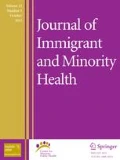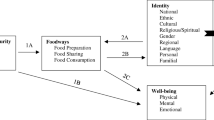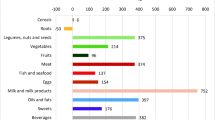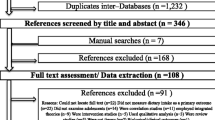Abstract
The purpose of this study is to determine the relationship between nativity and nutritional behaviors and beliefs in the Mexican American population living in the South Texas border region. Mexican Americans living the border region of South Texas were sampled to assess their nutrition behaviors and beliefs. Nativity was measured as whether subjects were born in the United States or Mexico. Nutritional behaviors were measured using the SPAN and indexes were used to measure barriers to good nutrition, dietary self-efficacy, and dietary importance. OLS regression analysis was used and adjustments were made for sociodemographic factors. Differences between US-born Mexican Americans and Mexico-born Mexican Americans existed in nutritional beliefs, but not in behaviors. Mexico-born Mexican Americans reported their dietary choices as more important and reported greater food self-efficacy than their US-born Mexican American counterparts. Socioeconomic status influenced US-born Mexican Americans nutritional beliefs only and the same effect was not observed for Mexico-born Mexican Americans. Despite low levels of overall acculturation in the border region dietary beliefs still exist between immigrants and US-born Mexican Americans in dietary beliefs, but, not behaviors in US-born Mexican Americans.
Similar content being viewed by others
References
Center for Disease Control. Overweight and obesity: US obesity trends 1985–2007. 2008. http://www.cdc.gov/nccdphp/dnpa/obesity/trend/maps/index.htm. Retrieved 7 Nov 2008.
United States Census Bureau. 2006–2008 American community survey. http://www.factfinder.census.gov. Retrieved 19 Feb 2010.
Center for Disease Control. Overweight and obesity: health consequences. 2009. http://www.cdc.gov/nccdphp/dnpa/obesity/consequences.htm. Retrieved 12 Jan 2009.
Manious AG, et al. Acculturation and diabetes among Hispanics: evidence from the 1999–2002 national health and nutrition examination survey. Public Health Rep. 2006;121:60–6.
Kahn LK, Sobal J, Martorell R. Acculturation, socioeconomic status, and obesity in Mexican Americans, Cuban Americans, and Puerto Ricans. Int J Obes. 1996;21:91–6.
Friel S, et al. Social diversity of Irish adult nutritional intake. Eur J Clin Nutr. 2003;57:865–75.
Minaker LM, et al. School region socio-economic status and geographic locale is associated with food behavior of Ontario and Alberta adolescents. Can J Public Health. 2006;97:357–61.
Shi Z, et al. Socio-demographic differences in food habits and preferences of school adolescents in Jiangsu Province, China. Eur J Clin Nutr. 2005;59:1439–48.
Neumark-Sztainer D, et al. Correlates of fruit and vegetable intake among adolescents, findings from project EAT. Prev Med. 2003;37:198–208.
Hulshof KF, et al. Diet and other life-style factors in high and low socio-economic groups. Eur J Clin Nutr. 1991;45:441–50.
Emmons KM, et al. Social influences, social context, and health behaviors among working-class, multi-ethnic adults. Health Educ Behav. 2007;34:315–34.
Gruber KJ. Social support for exercise and dietary habits among college students. Adolescence. 2008;43:557–75.
Steptoe A, et al. Psychological and social predictors of changes in fruit and vegetable consumption over 12 months following behavioral and nutrition education counseling. Health Psychol. 2004;23:574–81.
O’Dea JA, Wilson R. Socio-cognitive and nutritional factors associated with body mass index in children and adolescents: possibilities for childhood obesity prevention. Health Educ Res. 2006;21:796–805.
Hoelscher DM, et al. Measuring the prevalence of overweight in Texas school children. Am J Public Health. 2004;94(6):1002–8.
Sallis JF, et al. The development of scales to measure social support for diet and exercise behaviors. Prev Med. 1987;16:825–36.
Duffy KJ, et al. Birthplace is associated with more adverse dietary profiles for US-born than for foreign-born Latino adults. J Nutr. 2008;138(12):2428–35.
Montez JK, Eschbach KE. Country of birth and language are uniquely associated with intakes of fat, fiber, and fruits and vegetables among Mexican-American women in the United States. J Am Diet Assoc. 2008;108(3):473–80.
Neuhouser ML, et al. Higher fat intake and lower fruit and vegetables intakes are associated with greater acculturation among Mexicans living in Washington state. J Am Diet Assoc. 2004;104(1):51–7.
Gregory-Mercado KY, et al. Ethnicity and nutrient intake among Arizona WISEWOMAN participants. J Women Health. 2007;16(3):379–89.
Dubowitz T, et al. Neighborhood socioeconomic status and fruit and vegetable intake among whites, blacks, and Mexican Americans in the United States. Am J Clin Nutr. 2008;87(6):1883–91.
Acknowledgments
This work was supported by MD000170 P20 funded from the National Center on Minority Health and Health disparities (NCMHD), and the University of Texas Houston Health Sciences Center, Center for Clinical and Translational Science CCTS-CTSA award 1U54RR023417-01 funded by the National Center for Research Resources (NCRR).
Author information
Authors and Affiliations
Corresponding author
Rights and permissions
About this article
Cite this article
Montoya, J.A., Salinas, J.J., Barroso, C.S. et al. Nativity and Nutritional Behaviors in the Mexican Origin Population Living in the US-Mexico Border Region. J Immigrant Minority Health 13, 94–100 (2011). https://doi.org/10.1007/s10903-010-9342-8
Published:
Issue Date:
DOI: https://doi.org/10.1007/s10903-010-9342-8




